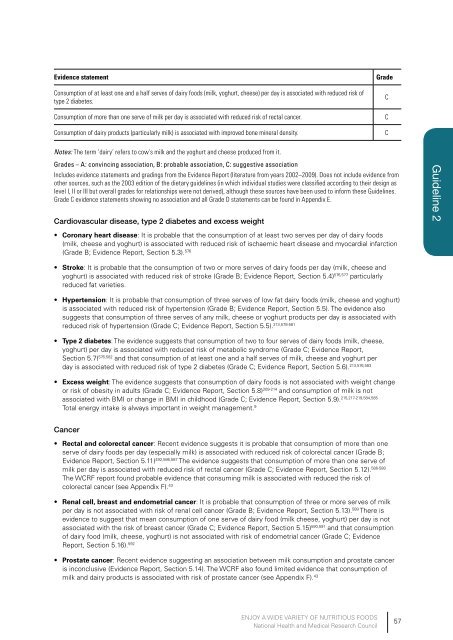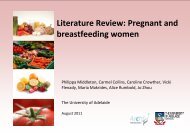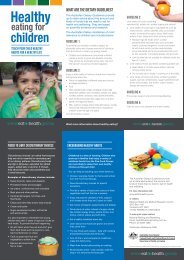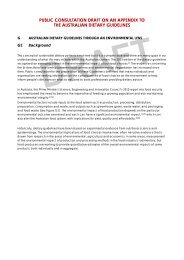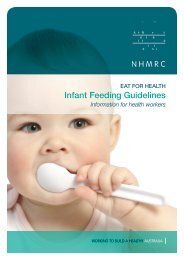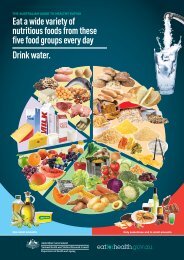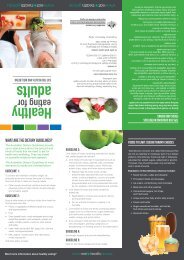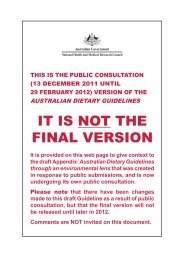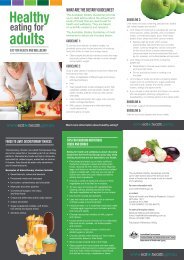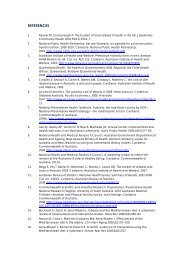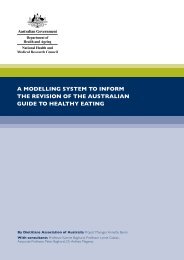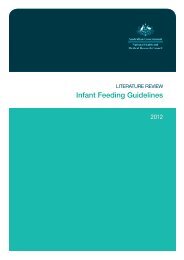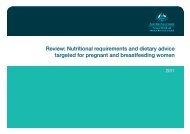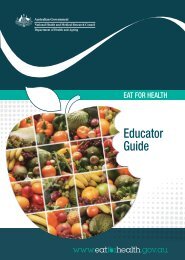Guidelines Dietary - Eat For Health
Guidelines Dietary - Eat For Health
Guidelines Dietary - Eat For Health
- No tags were found...
Create successful ePaper yourself
Turn your PDF publications into a flip-book with our unique Google optimized e-Paper software.
Evidence statementConsumption of at least one and a half serves of dairy foods (milk, yoghurt, cheese) per day is associated with reduced risk oftype 2 diabetes.Consumption of more than one serve of milk per day is associated with reduced risk of rectal cancer.Consumption of dairy products (particularly milk) is associated with improved bone mineral density.GradeCCCNotes: The term ‘dairy’ refers to cow’s milk and the yoghurt and cheese produced from it.Grades – A: convincing association, B: probable association, C: suggestive associationIncludes evidence statements and gradings from the Evidence Report (literature from years 2002–2009). Does not include evidence fromother sources, such as the 2003 edition of the dietary guidelines (in which individual studies were classified according to their design aslevel I, II or III but overall grades for relationships were not derived), although these sources have been used to inform these <strong>Guidelines</strong>.Grade C evidence statements showing no association and all Grade D statements can be found in Appendix E.Cardiovascular disease, type 2 diabetes and excess weightGuideline 2• Coronary heart disease: It is probable that the consumption of at least two serves per day of dairy foods(milk, cheese and yoghurt) is associated with reduced risk of ischaemic heart disease and myocardial infarction(Grade B; Evidence Report, Section 5.3). 576• Stroke: It is probable that the consumption of two or more serves of dairy foods per day (milk, cheese andyoghurt) is associated with reduced risk of stroke (Grade B; Evidence Report, Section 5.4) 576,577 particularlyreduced fat varieties.• Hypertension: It is probable that consumption of three serves of low fat dairy foods (milk, cheese and yoghurt)is associated with reduced risk of hypertension (Grade B; Evidence Report, Section 5.5). The evidence alsosuggests that consumption of three serves of any milk, cheese or yoghurt products per day is associated withreduced risk of hypertension (Grade C; Evidence Report, Section 5.5). 213,578-581• Type 2 diabetes: The evidence suggests that consumption of two to four serves of dairy foods (milk, cheese,yoghurt) per day is associated with reduced risk of metabolic syndrome (Grade C; Evidence Report,Section 5.7) 576,582 and that consumption of at least one and a half serves of milk, cheese and yoghurt perday is associated with reduced risk of type 2 diabetes (Grade C; Evidence Report, Section 5.6). 213,576,583• Excess weight: The evidence suggests that consumption of dairy foods is not associated with weight changeor risk of obesity in adults (Grade C; Evidence Report, Section 5.8) 209-214 and consumption of milk is notassociated with BMI or change in BMI in childhood (Grade C; Evidence Report, Section 5.9). 215,217-219,584,585Total energy intake is always important in weight management. 9Cancer• Rectal and colorectal cancer: Recent evidence suggests it is probable that consumption of more than oneserve of dairy foods per day (especially milk) is associated with reduced risk of colorectal cancer (Grade B;Evidence Report, Section 5.11) 492,586,587 The evidence suggests that consumption of more than one serve ofmilk per day is associated with reduced risk of rectal cancer (Grade C; Evidence Report, Section 5.12). 586-588The WCRF report found probable evidence that consuming milk is associated with reduced the risk ofcolorectal cancer (see Appendix F). 43• Renal cell, breast and endometrial cancer: It is probable that consumption of three or more serves of milkper day is not associated with risk of renal cell cancer (Grade B; Evidence Report, Section 5.13). 589 There isevidence to suggest that mean consumption of one serve of dairy food (milk cheese, yoghurt) per day is notassociated with the risk of breast cancer (Grade C; Evidence Report, Section 5.15) 590,591 and that consumptionof dairy food (milk, cheese, yoghurt) is not associated with risk of endometrial cancer (Grade C; EvidenceReport, Section 5.16). 592• Prostate cancer: Recent evidence suggesting an association between milk consumption and prostate canceris inconclusive (Evidence Report, Section 5.14). The WCRF also found limited evidence that consumption ofmilk and dairy products is associated with risk of prostate cancer (see Appendix F). 43Enjoy a wide variety of nutritious foodsNational <strong>Health</strong> and Medical Research Council57


